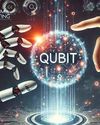
Once upon a time there was a town where people traded very valuable items. But the town had notorious thieves that kept stealing these items. So the people built a special lockbox and kept the items in them for trading. This was a strong box and could not be broken or destroyed to get the contents inside it. The only way to do that was by unlocking it. The box had two keyholes and did not have any fixed keys. A locksmith could make special keys for the box in pairs — if one of the keys in the pair was used to lock the box, only the second key in the same pair could unlock it.
This lockbox was used widely and it worked well. People kept one key of the pair outside their homes in a publicly visible place. Anyone who wanted to give them something made a copy of that key. They then kept that item in the person’s lockbox, used this copied key to lock it, and handed over the box. The second key of the pair was kept by the owner securely and not given to anyone, and only he or she could unlock the box with this second key. The thieves stopped stealing these lockboxes because they were unable to open them without the correct keys.
This worked very well for ages. But then some thieves broke into the homes of people and started stealing the second key that was with the owner. And once they got the key, they stole the contents from the lockboxes. This became a menace in no time as the thieves started stealing the keys from more and more people, who started losing the valuables kept in the lockboxes.
To overcome this challenge, people in the town started making vaults to keep their keys safely. These vaults were unbreakable and strong so the thieves could not steal the keys. The second key was kept in the vault and taken out only when needed.
But this, too, did not work for long because the thieves were able to find the keys to the vault to unlock it. Then they stole the keys from the vault!
This story is from the October 2024 edition of Open Source For You.
Start your 7-day Magzter GOLD free trial to access thousands of curated premium stories, and 9,000+ magazines and newspapers.
Already a subscriber ? Sign In
This story is from the October 2024 edition of Open Source For You.
Start your 7-day Magzter GOLD free trial to access thousands of curated premium stories, and 9,000+ magazines and newspapers.
Already a subscriber? Sign In

Amazon Bedrock: A Boon for the Financial Services Industry
Amazon Bedrock is a fully managed service that provides access to foundation models from top AI providers, enabling organisations to build and scale generative AI applications. It is specifically designed to bring AI solutions to the financial sector. Let's explore all that it can do...

Quantum-Safe VPNs: The Future of Secure Communication
As quantum computing continues to advance, it poses a significant threat to traditional cryptographic algorithms that secure our digital communications. Virtual private networks (VPNs), which rely heavily on encryption, are particularly vulnerable. Quantum-safe VPNs utilise post-quantum cryptographic algorithms to protect against quantum attacks.

Popular Open Source Toolkits for Quantum Machine Learning
Quantum machine learning is becoming increasingly popular due to its ability to solve the complex problems of the AI age. Here are a few open source libraries and frameworks that help with quantum computations.

Quantum Computing: Harnessing Open Source for Innovation and Accessibility
We explore how open source initiatives are shaping the future of quantum computing, making it more accessible and driving innovation through collaboration.

How Quantum Computing Differs from Classical Computing
Despite being in its infancy, quantum computing has numerous potential applications in modelling, cybersecurity, AI/ML, and other fields. But how do quantum and classical computing compare with each other? Let's find out...

From Bits to Qubits: The Growth Story of Quantum Computing
Quantum computing may still be in the early stages of evolution, but its potential impact on everyday life is significant. We delve into the key concepts behind it, the reasons for its rapid growth, and how global advancements are shaping its future.

Pytket: A Comprehensive Guide to Quantum Circuit Design
Pytket stands out as a powerful toolkit in the realm of quantum computing, offering a suite of features that cater to both researchers and industry practitioners. Its key strengths include optimisation, platform-agnostic support, flexible quantum circuit design and hybrid algorithm support. These features make Pytket a versatile tool for various quantum computing applications, from machine learning and cryptography to optimisation problems in industrial settings.

Cirq: The Open Source Framework for Programming Quantum Computers
Explore the key features, capabilities, and impact of Cirq, an open source quantum computing framework developed by Google, on the quantum programming landscape.

The Role of Open Source in Accelerating Quantum AI
Here's an overview of how open source frameworks are being utilised to build quantum machine learning models, including quantum neural networks and quantum kernel methods. The challenges and future directions in the quantum AI landscape are also discussed.

Quantum Machine Learning: An Overview
Quantum machine learning (QML) is a burgeoning field at the intersection of quantum computing and artificial intelligence. In recent years, the integration of quantum mechanics with machine learning algorithms has sparked substantial interest among researchers and technologists alike. Here's a quick look at the essentials of creating quantum algorithms for AI models, their practical use cases on open source platforms, and best practices for implementing these advanced algorithms.